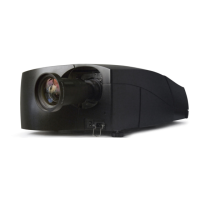7. Advanced
Image 7-4
4. Press ENTER to confirm your choice
A bullet indicates the selected composite video source which now appears on the screen.
Adjustments on a Composite video signal
The projectors allows different adjustments on a composite video signal. Depending on the type of signal (NTSC /PAL) the termi-
nology may differ :
• Contrast
• Brightness
• Color : adjusts the level of color saturation in a PAL signal
• Tint : adjusts the level of color saturation in an NTSC signal
• AGC: Automatic Gain Control
7.3.3 S-Video
When
Select the S-Video input when in presence of a video signal also called S-VHS signal.
An S-Video signal is available on the Mini-Din connector of a camera, VCR or DVD player.
Adjustments on a S-Video signal
The projectors allows different adjustment on a video signal. Depending on the type of signal (NTSC /PAL) the terms differ :
• Color : adjusts the level of color saturation in a PAL signal
• Tint : adjusts the level of color saturation in an NTSC signal
How to select the S-Video input ?
1. Press MENU to activate the Tool bar
2. Press ↓ to Pull down the Source Selection menu
The menu will contain one item Lx S-Video, x being the layer on which the composite video is connected (for example L3 S-Video
if the signal is connected to layer 3)
3. Use ↑ or ↓ to select Lx S-Video
Image 7-5
4. Press ENTER to confirm your choice
A bullet indicates the selected composite video source which now appears on the screen.
7.3.4 RGB-YUV
When
Select RGB-YUV when in presence of a data signal of the type RGB+ sync connected to the RGB input (5 BNC’s) or a component
signal of the type (R-Y)/Y/(B-Y).
These signals are often available on a VGA D15 co
nnector of a PC or another image generator.
58
R59770286 NW-12 07/09/2009

